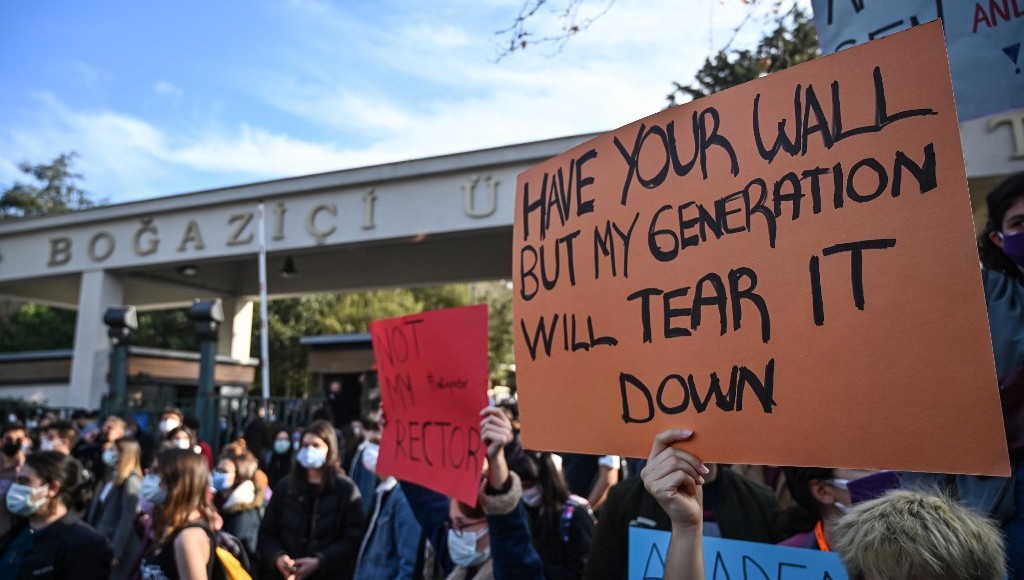Turkish academics who had gone abroad for better working conditions or those living in exile have brushed off a call from President Recep Tayyip Erdoğan calling an academics abroad to return home and “take part in the country’s development,” saying their return is impossible as long as Erdoğan’s government continues to limit freedoms in the country.
The president once again invited scientists who had moved overseas to come back to Turkey in an attempt to reverse the brain drain from the country during an address to a group of scientists in the Turkish capital of Ankara on Wednesday.
“If we want a fully independent Turkey, we need to aim for the top in science and technology. It’s very important that scientists who have done their academic and scientific studies abroad return home and support the development of their country,” Erdoğan said, adding that 199 scientists have returned to Turkey so far as part of a program launched for that purpose.
Turkish academics abroad reacted to Erdoğan’s call with caution and pessimism, saying that the exodus of intellectual talent from Turkey will persist as long as his Justice and Development Party (AKP) government refuses to grant academics freedom of expression, a fundamental right.
Professor Mehmet Efe Çaman, one of the thousands of academics who were fired from their jobs in Turkey by government decrees in the aftermath of an abortive putsch on July 15, 2016, said on X that he made the mistake of returning to Turkey in 2005, when he left Germany with his family to continue his academic work in Turkey, and regrets that decision.
He said in return for his idealism and nine years of academic work, he was “betrayed” by the country, the government and the society he had served, declared a “traitor” and together with his family was effectively deprived of all citizenship and human rights.
“Now, as a Canadian citizen and a professor at a Canadian university, I would like to put it in language that you can understand: Take your sham of a state and your disgraceful universities! Damn you, your society that supports you and your primitive culture. My advice to young academics is never to make the mistake of returning to Turkey,” Çaman said.
O hatayı 2005’te Alman vatandaşlığımı ve Almanya’daki 15 yıllık yaşamımı geride bırakıp Türk olmayan eşim ve 1 yaşından küçük kızımla birlikte Türkiye’ye dönerek yaptım. Bu idealizmimin ve 9 yıl vatan, öğrenci ve bilim sevgisiyle yardımcı doçentlikten profesörlüğe kadarki… https://t.co/o5VIyTGSbH
— Efe Caman, PhD (@MehmetEfe_Caman) December 27, 2023
Savaş Genç, a Turkish professor of political science at Germany’s Heidelberg University, said he heeded Erdoğan’s call once and saved his life by leaving the country again after being labeled a “terrorist.”
Genç also said Turkey has fallen to the bottom 10 percent, which also includes North Korea, China, Syria, Myanmar and Saudi Arabia, in the Academic Freedom Index (AFI), ranked 166th among 179 countries in 2023.
Bu çağrıya bir kere uydum. Terörist damgası yedikten sonra canımı kurtardım. Türkiye 2023 akademik özgürlüklerde Kuzey Kore ile aynı seviyeye düştü. Daha dazla bir şey yazmaya gerek yok sanırım! https://t.co/OV2ueq51Q0
— Savaş Genç (@savasgnc) December 27, 2023
Timur Kuran, a professor of economic and political development at Duke University, also said the president’s appeal will “fall on deaf ears” since Turkey’s brain drain will continue as long as the Erdoğan regime denies academics basic expressive freedoms.
Erdoğan calls on foreign-educated Turkish academics to “return to Turkey and participate in the country’s development.” His appeal will fall on deaf ears. Turkey’s brain drain will continue as long as his regime denies academics basic expressive freedoms. https://t.co/Gcxl7e54Vm
— Timur Kuran (@timurkuran) December 28, 2023
Pro-Kurdish Equality and Democracy Party (DEM) lawmaker and prominent human rights activist Ömer Faruk Gergerlioğlu also emphasized during a press conference on Thursday that Turkish academics would not leave the country and would return if the AKP government abandoned its anti-democratic practices.
Bilim insanları sizin yönetiminizden kaçmış şimdi de dönün diyor Sn. @RTErdogan! Siz anti demokratik uygulamalarınızdan vazgeçerseniz insanlar da kaçmazlar dönerler! https://t.co/xSJuuGjlOP
— Ömer Faruk Gergerlioğlu (@gergerliogluof) December 28, 2023
A study published by the Turkish Informatics Foundation (TBV) in April titled “Turkish Academic Diaspora Report: From brain drain to brain power” found that academics with the highest level of productivity are leaving Turkey to continue their work abroad, with 12,000 such academics working in other countries.
Following a coup attempt in 2016, the Turkish government dismissed some 130,000 people from public service, among them more than 30,000 teachers and over 7,000 academics.
The Turkish government is frequently criticized for curtailing academic freedom, with many academics facing legal action, losing their jobs or even going to jail due to their criticism of government policies or for simply expressing their views about a problem in the country.
In a move that curbed academic freedoms further, Erdoğan in October 2016 canceled the intra-university elections that used to be held to elect university rectors. That position is now directly filled by the president.
Erdoğan insisted that the abolition of the election system would be beneficial for the country, although the move attracted widespread criticism in that it would eliminate the autonomy of universities.

